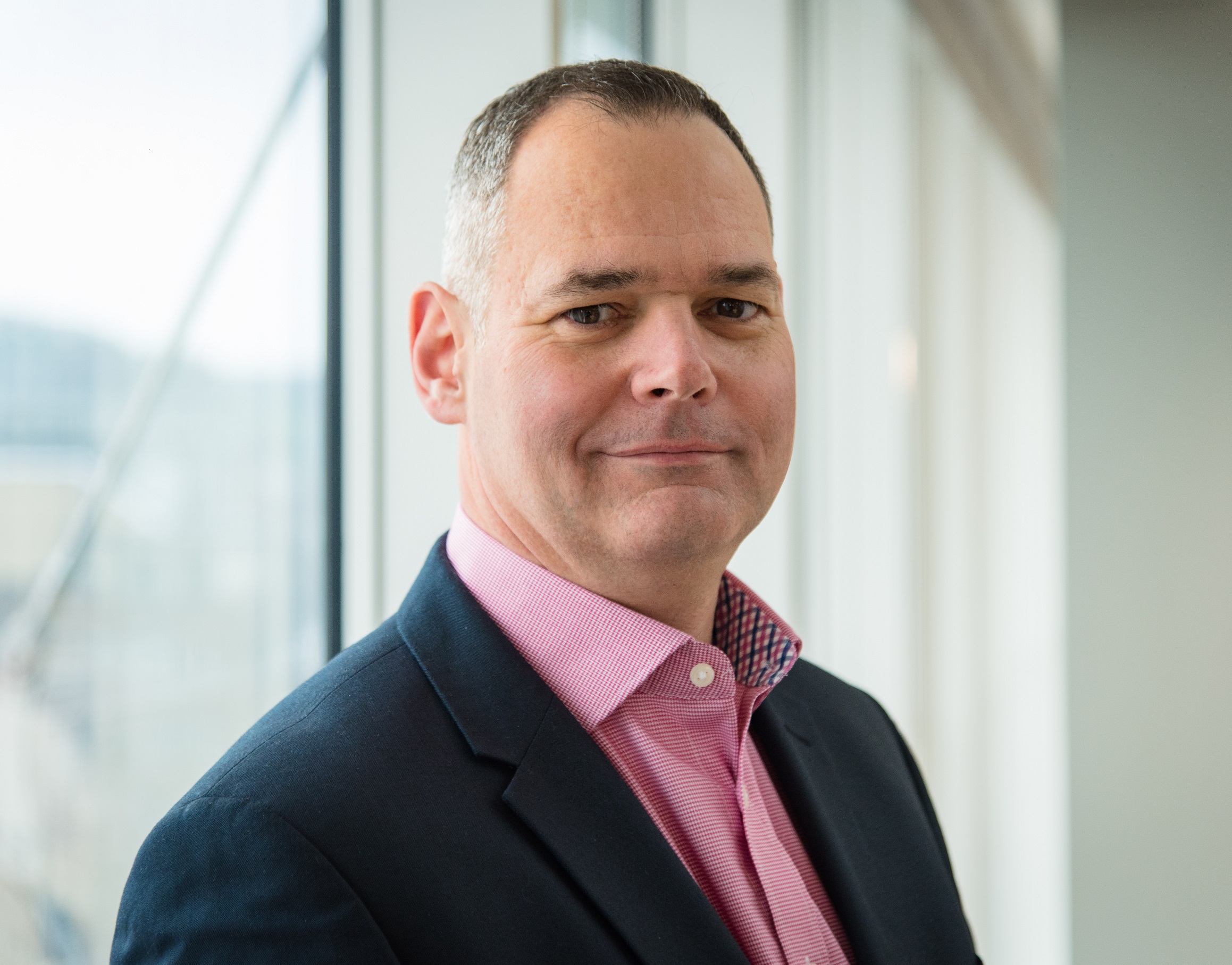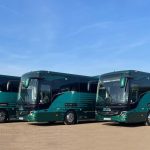Paul O’Neil heads the Arriva UK Bus arm after seeing success in the aerospace industry. He is keen to bring some of that sector’s practices with him to buses – with data a key to his aspirations for the business
There’s a new man at the top of the Arriva UK Bus division: Paul O’Neil. He joined the business as Managing Director in May.
Paul has held senior positions with Rolls-Royce, most recently within its civil aerospace division. There, he gained experience of many cultures and ways of work and, with direct relevance to the bus industry, of a sector that is having many debates about its digital capabilities and sustainability.
Arriva is currently for sale by owner Deutsche Bahn (DB), but it remains business as usual all the same. For Paul, that means not only learning about buses, but also bringing in best practice from aerospace to improve efficiencies and drive customer satisfaction.
“When I was approached by Arriva, I quickly realised that the bus industry is on the cusp of significant change,” he says.
“It is at the heart of the UK’s economy and operates in a highly-competitive market. Passenger numbers are declining, and external funding has been reduced. That means the sector must bring its A-game, which is what attracted me to the role.”
It’s true to say that there remain some traditional practices within the industry, but that is not to suggest that they have failed to deliver success. Where the buses are not looking backwards is the attitude to safety, although it can still learn from aviation in that regard.
But the aerospace business is undoubtedly well ahead of most bus operators where data is concerned. Appropriate use of the increasingly vast amounts of data that are available to Arriva is at the core of what Paul wants to do. That will be relevant to its engineering and operational sides, as well as being key to improving the customer experience.
Driving best practice by leaning on data
Aero engines such as those made by Rolls-Royce each have millions of data points, and the aerospace industry is focused on its digital capabilities. If the same depth of performance and usage knowledge can be generated for buses and their passengers, there is significant potential to reduce costs and attract more customers.
“Collection of driveline data via telematics – where mechanical units report their condition – opens the door to preventative maintenance,” says Paul. “That would allow us to maximise the efficiency of our operational performance; it enables maintenance and overhaul to be planned on an hours basis, rather than waiting for something to go wrong.
“From an efficiency point of view, there is nothing worse than a line of defective buses. If we change our approach to maintenance, we can plan how parts are held more effectively and create a resource-based plan for repairs.”
Arriva UK Bus is currently undertaking an engineering improvement programme that commenced long before Paul’s arrival. It is one of several such processes that are ongoing within the business. He is keen to support and encourage all of them.
External engagement key to new man’s ideas
Engagement is key if the bus industry is to maintain its progress into the digital age and further benefit from what data can do. It must work with three stakeholder groups: Customers, its own people and politicians.
Engaging with government, both local and national, is not an issue just for Arriva. Paul believes that the industry must present a united voice to help elected officials to understand its position. The green agenda and the wishes of their constituents are often at loggerheads, placing them in an unenviable position.
Involvement with politicians is also relevant to the re-regulation debate. Arriva has operations in more than one area where the franchising drum has already been beaten. Its approach is that partnership working delivers the best results. Nevertheless, Arriva is ready to engage with the re-regulation process in provincial markets if it materialises.
“We know how to work effectively in a regulated market. We have an 18% share of the London network and we are consistently ranked top for KPIs. But we can also work in partnership. We have been involved in the Merseyside Bus Alliance since its inception and we are very happy with it.”
One particularly successful element of the Merseyside partnership has been the introduction of MyTicket. It allows unlimited all-day travel for those aged between five and 18 for £2.20. When introduced, it came with a growth target of 10%. That figure has been far exceeded, demonstrating that buses can be attractive to young people. And that is a demographic that can be leveraged in the future.
“I speak to my own children and they talk about sustainability. They know much more about it than previous generations did at their ages. That’s a positive for the industry.”
Young people also form an important part of Arriva UK Bus’s workforce. In 2018 it brought 370 new apprentices into the business in numerous disciplines, including as drivers and in engineering and operational roles. That focus will continue.
Additionally, work will be done to ensure that apprenticeship programmes keep pace with industry developments. That’s particularly the case in engineering roles, where changes in vehicle technology demand a different skillset than previously.
Digital platform ‘vital’ to leveraging young person demand
A competent digital payment and information platform is vital if the young people’s market is to be tapped effectively. Arriva now has contactless payment acceptance on all its buses in the UK and its overall digital offering will be refreshed towards the end of 2019.
Currently, contactless for Arriva is at its most basic form as a cash replacement. It will develop into a tap-on, tap-off application, where the cheapest single, daily or period fare is calculated and debited automatically.
Where no cash is accepted is on the ArrivaClick demand-responsive minibus service. It debuted in Sittingbourne in 2017 and has since been rolled out to Liverpool and an area of new housing in Leicestershire. The concept remains in its pilot phase, but it is showing promise.
“ArrivaClick is not the finished article. We are still understanding who uses it, how and why they use it, and when they use it. In Leicestershire, Liverpool and Sittingbourne the target markets have been very different, which is helping with that process,” says Paul.
As ArrivaClick is app-based, it generates lots of data. Analysis of that allows spare capacity to be identified, and further development of the concept may allow its minibuses to be utilised on other duties at off-peak times, such as local authority contracts and business-to-business transfers.
Building a future based on pride and knowledge
What the future holds for Arriva as part of DB remains to be seen. But as a bus business, Paul is confident that there will be opportunities that will deliver success if the group makes good on its contribution to what the industry collectively needs to do.
One of his early resolutions was to visit every Arriva depot in the UK. That is ongoing at the rate of one per week. At those he has called at so far, he speaks of staff who care about what they are doing. That’s something to be pleased with.
“There is a sense of pride in depots and there is a great deal of local knowledge. Our people are dedicated to providing a service to the customer; they know that the only way buses will prosper is for them to be out in the field, serving the community.”
That element of old-school thinking will form a long-term part of Arriva’s model going forward, but if success is to be assured then it will need to be joined by new ideas.
Paul’s knowledge of the aerospace industry, where assets are often leased, may come to influence the policy for vehicle procurement; aviation’s focus on safety is another area where lessons may bolster the bus industry’s existing work.
He is keen to explore options for how new fleets are funded, particularly when they are powered by alternative fuels. A policy of applying for government support for such vehicles when it is available will continue, but leasing may come to be favoured in some purchasing decisions.
The aim for Paul’s tenure as leader of Arriva UK Bus is clear. It’s to turn the business into what he terms “the best bus company in the country.” There’s a lot to be done to achieve that. But if the basics are put in place – and there is every sign that they will be – the rest may follow.

























